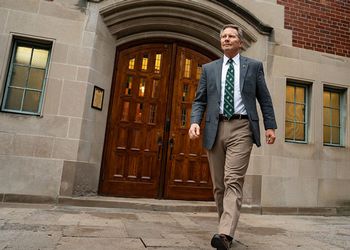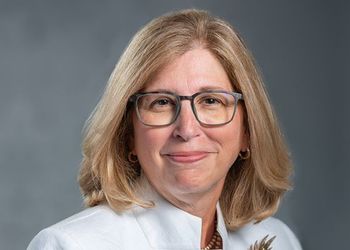Feature: MSU and Africa an Extraordinary Connection

MSU AND AFRICA AN EXTRAORDINARY CONNECTION
MSU’s longstanding linkages with Africa, whether based on academics, research or economic development, are helping the university align its world-grant vision.Although the MSU campus is new to Stella Nhanala, her experiences with MSU are not.
Back home in Mozambique, she worked with MSU faculty on an initiative to reduce poverty and hunger across the African continent. Working with the African Biosafety Network of Expertise (ABNE), she found her passion for science and technology—and later made her way to East Lansing as one of the first students in The MasterCard Foundation Scholars Program (see p. 6, Winter 2013).
“I want to go home and help contribute to the transformation of Mozambican agriculture,” says Nhanala, who is working toward an MSU degree in plant breeding and genetics. “I also want young women to see that they can help stimulate Africa’s development and be the bridge that brings new science and technology to society.”
Stella’s story is not only inspirational, but also a microcosm of MSU’s connection to the African continent and its people. Last September, MSU joined The MasterCard Foundation’s global network of institutions that were selected for their shared values, academic excellence, nurturing environment and programs relevant to growth sectors in Africa.
As Africa experiences an economic and political resurgence, MSU is uniquely poised to help fuel the continent’s aspirations for change—including Stella’s desire to become a role model for young women and help her country’s agricultural transformation.
World leaders are noting the growth in Africa of new industries in manufacturing, telecommunications, banking and agriculture. Youthful energy is leading the charge, as 70 percent of the continent’s population is under the age of 30. A new historic era seems to be dawning in Africa, led by sweeping changes from politics to markets and from farms to banks.
Initiatives for Africa’s future abound at MSU. The university’s urban planners and demographers show Africa to possess a young, vibrant, sophisticated and increasingly urban population. MSU’s political scientists, who head up the Afro-Barometer Project, have charted the steady spread of democratic institutions and the deepening of respect for openness, transparency and civic participation. Journalists are working hand-in-hand with a new caliber of African investigative reporters. The MSU Museum’s cultural heritage and arts specialists are witnessing the explosive growth of a creative economy in Africa and are supporting museums to showcase traditional and contemporary arts and cultures. Agricultural scientists and development specialists on campus note a new atmosphere of confidence and collaboration as African leaders cooperate with neighboring countries, build new region-wide institutions, establish programs of food security and food safety, and plot a course of pan-African development. Everywhere in Africa it is now recognized that private capital and local entrepreneurship have a role to play in fostering and sustaining development.
“Michigan State University is fortunate to have cultivated the types of partnerships over the last 50 years that now allow us to observe, participate, analyze and contribute to this unique historical moment in Africa,” says James Pritchett, director of MSU’s African Studies Center.
MSU is distinctive among the world’s universities in the role it has been asked to play in support of African Union initiatives, including the development of the ABNE and food security programs in a number of countries.
Historically, MSU led the U.S. with the number of doctoral dissertations on Africa and its development. “We also are providing more opportunities for students to study in Africa than any other U.S. university through 29 study abroad programs on the continent,” says Pritchett.
East Lansing is alive with Africa-focused activity: 160 MSU faculty members are researching and teaching about Africa, weekly public lectures are delivered on African topics and regular visits are made by numerous African scholars and faculty independently or through the Fulbright program. The 26 year-old African Students Union attracts American and international students from all over the Midwest through an annual African Culture Festival.
During each academic year, MSU boasts a total of about 200 undergraduate and graduate African students who have constructed alternative narratives about Africa, through their academic excellence, their interactions and their programming around Africa. Dozens of other student organizations engage in African issues, running both charitable programs for various causes, and supporting the budding interest in studying abroad to learn about Africa.
MSU’s connection to Africa began in the 1950s when a common philosophy about higher education united two incredible leaders. That philosophy—rooted in a land-grant tradition—has distinguished MSU for more than 150 years. It’s also what connected Nnamdi Azikiwe, the first civilian president of Nigeria, and John A. Hannah, MSU’s president from 1941 to 1969. Both men believed that higher education should be available to all and that universities should aspire to serve the needs of the nations in which they are based.
Zik, as he was affectionately called, envisioned a “people’s university” that could address the country’s pressing development needs. He traveled to New York to request support from the Rockefeller and Ford Foundations, among others, for the first “American” land-grant type university in Africa, but they weren’t forthcoming.
Zik often told the story of being dejected but not giving up hope. He remembered walking from the Upper West Side in Manhattan toward the downtown Wall Street area, and seeing a skyscraper with “cobs of maize” carved in the limestone frieze. “I knew in an instant,” he recalled, “that if you can build a skyscraper in New York with maize, you can build a university in Nigeria with palm oil.”
Several years later Azikiwe returned to New York with a bank certificate for the 2012 equivalent of almost $61 million earned from a tax on palm oil production in Eastern Nigeria that he had engineered as governor of the province. Again, he asked for assistance. This time, the foundations referred him to MSU President John Hannah and to the U.S. Agency for International Development.
Hannah and a number of MSU faculty members quickly accepted Zik’s invitation. By 1967 the University of Nigeria had 30 faculty members from MSU and 400 from Nigeria, and its first graduates earned the best civil service examination scores in the country.
MSU faculty members and their families contributed more than 200 person-years in Nigeria to build the University of Nigeria. From that experience, they gained knowledge and affection for the Nigerian people and returned home to bring an African focus to their teaching, research and service back in East Lansing.
MSU AND AFRICA TODAY
Since then, MSU’s work has grown exponentially throughout Africa. Strategic long-term collaborations have engaged MSU faculty for more than 40 years in Senegal and Zambia; 30 years in Mali; more than 25 years in Malawi; 20 years in Mozambique; and 15 years in Kenya. Additionally, recent faculty research and service activities have taken place in many other countries, including Angola, Burkina Faso, Burundi, Gambia, Ghana, Guinea, Kenya, Namibia, Nigeria, Senegal, South Africa, Tanzania, Uganda and Zimbabwe.
Many MSU faculty members have focused on addressing the development needs of the African continent. These experiences have helped sharpen MSU’s focus on four research themes critical to the continent—food, environment, education and health.
“MSU faculty involvement in agriculture in Africa is probably the largest of any U.S. institution, including dozens of projects on food security, drought coping, food markets, women in development, new crop varieties and training African faculty, ” says Duncan Boughton, associate professor for international development and co-director of MSU’s Food Security Group.
Boughton says there is terrific leadership in Africa on food security issues. “I also think it is fair to say that African MSU graduates have had an enormous role in developing that leadership over the years,” adds Boughton.
Having lived and worked for most of his professional life in sub-Saharan Africa, Boughton has been a part of the MSU team developing a set of core principles to guide the university’s food security work. “One of our core principles has been to build local capacity,” he says. “It’s really important to focus on the local concerns and the problems in-country partners are interested in addressing.”
“It’s also important to note that not all of our advice is taken—and rightfully so,” he says. Boughton explains that when you come from a scientific or particular world region view you can only recommend what you think is best from your own perspective. “This is why it is so important to take a long term view,” he notes, adding that it’s the learning taking place on both sides of the partnership that often leads to success.
The Veterinary and Animal Science faculties have worked on livestock disease and production, game animals and species preservation. Medical faculty members have addressed the pathology, epidemiology, pharmacology and treatment of pressing topical diseases—HIV/AIDS, malaria, tuberculosis, schistosomiasis, onchocerciasis, hypertension and elephantiasis.
University Distinguished Professor John Kaneene leads a multi-disciplinary team looking to untangle the chain of tuberculosis infection between farmers, livestock and wildlife.
As a veterinarian, epidemiologist and public health expert, Kaneene is applying a disease prevention model developed in Michigan to the TB challenges in Uganda. At the same time, he is studying specific bovine TB strains that are most likely to infect people in Africa but also in the U.S. Kaneene is sharing that knowledge with other MSU researchers who are working on drug-resistant TB.
“Right now solving a problem requires an interdisciplinary approach,” says Kaneene. “And with a global disease like TB, it’s very important to look at the whole interface.
“Currently we are working with partners at Johns Hopkins and Makerere University in Uganda to study the patterns of infection.”
Education faculty members have worked in African higher education administration and coordinated effective classroom practices across the continent. For their part humanities faculty members conduct research on African and Middle Eastern literature and film, religion, languages, language pedagogy, philosophy, music and history, and have the largest faculty on the history of Africa of any U.S. university.
Social scientists are working on a wide range of African topics, including women in African development, urban waste management and industrial pollution, standards for African exports, democratization and civil society, environment, natural resource and water management, religion, fishing, health delivery, journalism and communications, development policy, globalization, climate change, water and land rights and U.S. foreign policy.
In 2008, accepting an honorary doctorate from MSU in absentia, Nelson Mandela issued this statement:
“It is a privilege to receive the honorary degree from Michigan State University. We recall your support during our struggle for freedom. Many universities and colleges, religious organizations, labor unions, and local and state legislatures followed this example. We are inspired by your numerous programs that continue to support our efforts to transform our country. In this spirit of continuing friendship we wish to challenge you to act accordingly in addressing the many challenges confronting our continent and our world.”
A number of faculty members at MSU have applied strong pro-Africa standards to work in Africa. They are also at the forefront of promoting strong codes of research ethics for MSU faculty and graduate students in Africa and in upholding standards for partnerships with faculty in African universities and colleges. Faculty members and students also have a history of vigorously supporting human rights throughout Africa.
Diran Makinde, director of the African Union’s NEPAD (New Partnership for Africa’s Development) Planning and Coordinating Agency, African Biosafety Network of Expertise, describes his organization’s partnership with MSU as one-of-a-kind.
“Throughout my career I have been involved in a lot of academic linkages, but I have never seen the way in which Michigan State University has committed itself to a partnership,” he says.
“We have a handshake that extends beyond the elbow,” says Makinde. “It is this type of handshake that has solidly defined everything between NEPAD and MSU. And that says a lot considering everything at NEPAD is about partnership.”
“We have learned a lot from our partnership with ABNE and NEPAD,” says MSU President Lou Anna K. Simon. “When we think about our job and the concept of a land-grant university it is always about listening and being able to mobilize your assets in ways that make a positive difference.”
One of MSU’s major contributions to Africa over the years has been through the thousands of African students who have completed bachelors, masters, and Ph.D. degrees at the university. MSU graduates have become vice presidents, legislators, ministers, permanent secretaries, vice chancellors, and directors of departments and institutes in government, higher education and the private sector across Africa.
MSU has long been popular with African students. “We offer the opportunity to interact with other African youth from far more countries, more ethnic and linguistic groups, and representing more differing stations of life than had been possible in their home countries,” says Jeffrey Riedinger, dean of International Studies and Programs.
“Relationships are built at MSU, plans are constructed and networks emerge that serve students’ needs and then throughout their professional careers.”
Winnie Imbuchi, a junior studying comparative culture & politics from Kenya has found her home away from home at MSU. “I was persuaded that MSU was the ideal space for me to unite my Africanist vocation with my budding political consciousness,” she says. “I gave up a couple of full ride scholarships to universities on the East Coast for the harsh Michigan winters and the chance to work with so many African scholars.”
“More than a few of our African undergraduates return later to do graduate work or seek additional professional training,” says Riedinger.
Looking forward to 2020 and beyond, it is clear that several game-changing trends will have an enormous impact on how MSU equips its students and focuses its research particularly in Africa.
“These megatrends—urbanization and pressures on land; global connectivity; regional integration; access to education; changing population demographics; and the influences of democracy among others—will demand a unique set of skills,” says President Simon.
Critical skills such as problem solving and cross-cultural communication will be essential, along with scientific and technical skills related to the environment and food industries; analytical expertise for operating in a market economy; greater understanding of policy impacts on all sectors of society; and a familiarity with the flow of capital around the world.
“If we are to bend the trend toward a more equitable and sustainable world, it is incumbent on us to put knowledge to work on these powerful currents that will benefit people at home, in Africa and around the world,” says Simon.
Simon says MSU’s connections and international expertise are behind some recent and significant grants for education-focused programs. “The U.S. Agency for International Development awarded us $24.9 million to set up a Global Center for Food Systems Innovation,” she notes. “That center will connect a group of development problem-solving institutions, a holistic, interdisciplinary, sustainable approach to food systems that stresses knowledge of global mega-trends and local impact.”
This past fall MSU announced a partnership with Toronto-based The MasterCard Foundation. Under a nine-year, $45 million agreement the university has become part of a consortium of international institutions to train a large group of undergraduate and graduate African students and serve as the hub for the program’s scholar and alumni network.
Stephanie Motschenbacher is
the director of communications
for MSU’s International Studies and Programs.
AFRICAN STUDIES RESOURCES AT MSU
The African Studies Center, a unit serving faculty and students from 59 MSU departments, is one of the leading world area studies centers in the United States. Designated as a U.S. National Resource Center for African Studies by the U.S. Dept. of Education, the center provides vast opportunities for faculty and students to engage Africa in and outside the classroom.
MSU’s Africana Library Collection is a leading collection in the U.S. and supports the university’s research on Africa, as do the art and artifacts in the MSU Museum and the MSU Broad Art Museum. MSU disseminates African information through, among others, websites on African film and video, online curriculum on South Africa, African higher education, and African academic journals online.
African Online Digital Library is a portal to multimedia collections about Africa and its history, developed by the African Studies Center and MATRIX: The Center for Humane, Arts, Letters and Social Sciences Online at MSU. The digital collections are managed in cooperation with MSU’s African Studies and partnering universities and cultural heritage organizations in Africa. Plans are underway to add digital tools in order to enable scholars to work with and add to these materials.
MSU’s outreach program on Africa is the largest in the nation, including programs for 75 universities and four-year colleges and 29 community and junior colleges. The program focuses on teaching about Africa for undergraduate students. Outreach to school teachers, students, administrators, and board members includes resources such as Exploring Africa and South Africa: Overcoming Apartheid Building Democracy, two online secondary school curricula resources. Outreach to state and federal government and to legislators links Africanist scholarship to U.S. policy making on Africa, and these resources, as well as many others, are available to the general public, media and business.
Another area of emphasis has been MSU students’ knowledge of African languages. With five African linguists, MSU offers approximately a dozen languages every year including Arabic, Chichewa, Hausa, Igbo, Kikongo, Swahili, Yoruba, Xhosa and Zulu. MSU’s African Language Program is one of the leading programs in the nation aimed at improving African language instruction and creating a model for offering languages needed by scholars to conduct research in Africa.
As a leader in study abroad, MSU offers some 29 study abroad programs in Africa, more than any other U.S. university.



